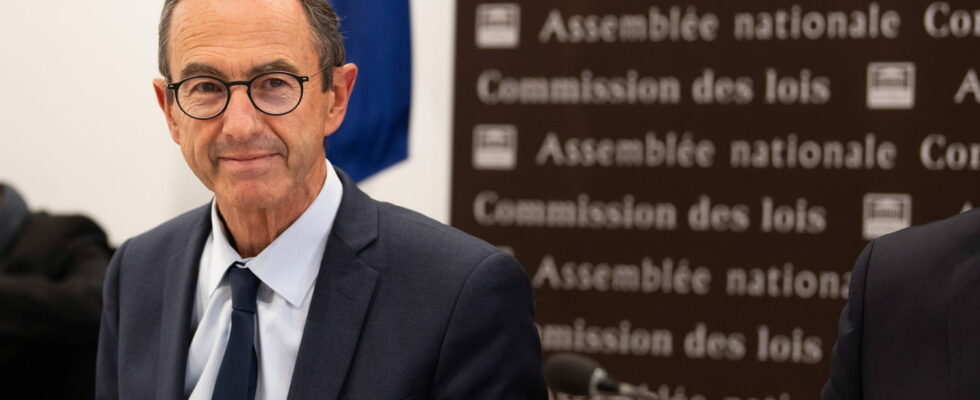A “new immigration law” will be presented to Parliament at the start of 2025, the government spokesperson confirmed. The text could contain measures already defended by the right, Bruno Retailleau in the lead, and censored.
The Minister of the Interior had mentioned it, the government spokesperson confirmed it: there will indeed be a new immigration law at the start of 2025. The announcement made by Maud Bregeon on the set of BFMTV Sunday October 13 has already caused a lot of stir: it irritates and annoys the left, while it divides within the presidential camp. The far right has not yet reacted, but there is no doubt that it is satisfied with the project that Marine Le Pen had explicitly called for after Michel Barnier’s general policy speech. While the National Rally had set the tabling of a new immigration law as a condition for its non-participation in a motion of censure, the left accuses the Barnier government of bending to the extreme right and of “giving them guarantees”.
But it was Bruno Retailleau, Minister of the Interior, who opened the way for a new bill, less than a year after the adoption of the last immigration law on January 26, 2024, which he, with the LR party, largely shaped. However, a significant part of the measures imposed by the right in the latest text were censored by the Constitutional Council. With a new immigration law, the Minister of the Interior sees an opportunity to have his entire, very right-wing, project concerning migration policy in France adopted.
And the member of the government found the pretext to initiate a new immigration law: the extension of the duration of detention of foreigners subject to obligations to leave the territory (OQTF) and deemed dangerous in administrative detention centers from 90 to 210 days . However, “a law is necessary to do this” clarified Matignon. Once the door was opened to a new immigration law, the executive rushed into it and “does not refrain in principle from including other provisions” according to the confidences of a government source at Parisian. “All this will be done within the framework of dialogue, without ideology” specifies the same person.
Measures already seen in the Darmanin law
The previous immigration law carried by Gérald Darmanin, former Minister of the Interior and revised by the right proposed a series of measures aimed at toughening migration policy. At the ministry, the current tenant imagines himself defending similar measures such as the fixing of a migratory “quota” fixed each year by Parliament to limit the number of regularizations, the reinstatement of the offense of illegal stay, the restriction of reunification family and the restriction or suppression of land rights. So many policies were rejected by the Constitutional Council at the start of the year, because they were considered “legislative riders”, that is to say unrelated to the initial bill. A few months later, the Barnier government showed confidence in the admissibility of the measures: “The Constitutional Council censored these provisions for formal reasons and not for substantive reasons. We are not stopping ourselves from doing anything”, underlined Maud Bregeon.
The Minister of the Interior has already considered ways to reduce immigration and has presented some of them to the prefects. During an emergency meeting organized on Tuesday, October 8, Bruno Retailleau invited the prefects to rely on provisions of the latest immigration law toughening the regularization criteria and relaxing protections against removal measures. The minister, during the same meeting, indicated that he wanted to tighten up the Valls circular of 2012 to reduce the number of regularizations obtained due to their private, family or professional life, according to The World. Among the modifications envisaged, some would consist of introducing new criteria such as “proficiency in French” or “assimilation of French values”.
A mixed reception to the new immigration law
Gérald Darmanin’s immigration law was ratified after long months of tough negotiations, not without weakening the presidential camp which lost a few elected officials in the battle. If the bill had been supported by the right and the far right, within the former majority 17 Macronist deputies had abstained from voting and 20 had opposed it. Similar divisions are already emerging: on the one hand Gérald Darmanin does not rule out supporting the law “if things are positive for the security of the French” as he indicated on 20 Heures de France 2on the other hand certain deputies like Stéphane Travert do not adhere to the project: “I am totally opposed to going back on an Immigration law” declared the elected official at the Parisian.
The Barnier government will have to be convincing to justify the usefulness of a new immigration law. The former Prime Minister has already raised this point on France Inter on October 14 recalling that “certain measures [de la dernière loi immigration] are not in force, because the decrees have not yet been issued.” Gabriel Attal is also waiting to know what the text will contain: “Making a law for a law’s sake, without explaining to us what would be in it, don’t let me does not seem to be a total priority”. The new president of the group of Macronist deputies in the National Assembly, however, says he is “ready to have a debate, a discussion on measures”. It remains to be seen which ones.
